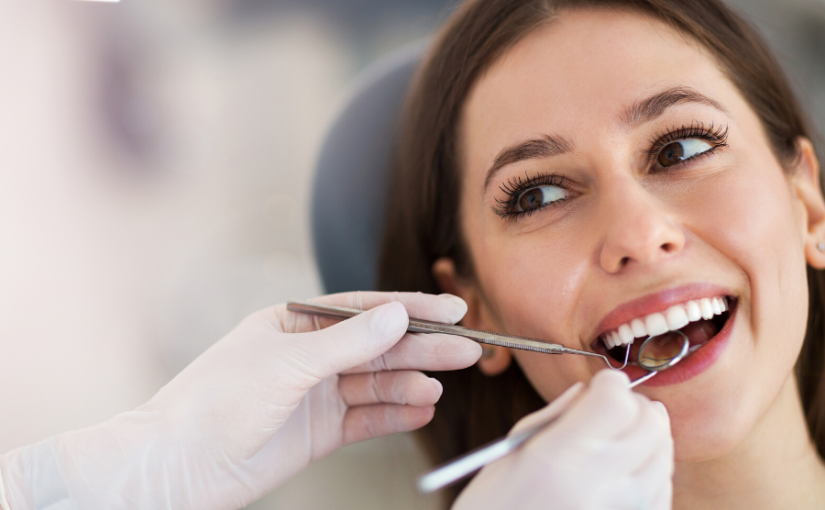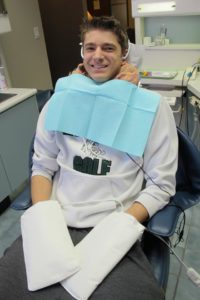FULL MOUTH RECONSTRUCTION, EXPLAINED
At Eggert Family Dentistry, our comprehensive approach means that we focus on your overall oral health. Instead of regarding your teeth in isolation, we take a holistic and comprehensive perspective on how your mouth functions as a whole, and how it functions in relation to your whole body.
In some cases, patients exhibit a constellation of issues that are best resolved by a full mouth reconstruction. This typically is caused by trauma to the jaw or teeth, significant decay, long-term erosion from acid or tooth grinding, or long-term structural issues such as a misaligned bite.
In these cases, restoring and rebuilding all of the teeth in both the upper and lower jaws may be the best strategy.
A full mouth reconstruction is likely to involve a number of phases and specialties, including:
- General or restorative dental procedures such as crowns, bridges, and veneers with Dr. Jeff or Dr. Elizabeth
- Periodontal attention to the gums
- Oral surgery
- Orthodontics to address tooth movements and positions
What to Expect When Considering a Full Mouth Reconstruction
When you are considering a full mouth reconstruction, here’s what you can expect at Eggert Family dentistry.
We’ll start by doing a detailed evaluation of your muscles, jaws and teeth, and their relationships with each other. We’ll talk about all health considerations relating to your mouth, including information about sleep and airway, and we’ll ask you about your esthetic goals. Next, Dr. Elizabeth or Dr. Jeff will take you on a tour of your mouth, explaining different treatment options. They’ll explain everything carefully and answer questions so you can make excellent decisions, and together we’ll come up with a treatment plan.
These are the kinds of procedures that are often part of a full mouth reconstruction:
- Initial deep cleaning of your teeth and gums.
- Ensuring a stable bite so your restored teeth will not suffer undue wear. This might require orthodontics or a bite reprogramming orthotic/splint. Your occlusion, or how your teeth contact, must be addressed before we perform additional restorative procedures.
- Tooth restorations, which can include porcelain veneers, crowns, inlays or onlays, bridges, and implants.
A Big Commitment with Big Rewards
A full mouth reconstruction is an ambitious endeavor with huge rewards. Many patients feel transformed when treatment concludes and they have an attractive smile and a healthy mouth, free of pain or discomfort. In many cases, even severe TMJ (temporomandibular joint disorder or TMD) pain can be relieved by the comprehensive approach and comprehensive reconstruction.
This treatment is a long-term project, involving multiple visits, but Dr. Elizabeth and Dr. Jeff are happy to walk you through every aspect of your treatment plan, so you have a very clear idea of the timeline and what to expect.
If you are experiencing ongoing pain or discomfort in your mouth or jaw, or if you want a new improved smile which you’re excited to share with people, or if your teeth are broken down and need to be rebuilt, please contact Dr. Jeff or Dr. Elizabeth at Eggert Family Dentistry, 651-482-8412. We love to help people experience the transformation in oral health and confidence that can accompany a full mouth reconstruction.





 At Eggert Family Dentistry, we work hard to make sure our patients are physically comfortable and mentally at ease. That’s why we have available a variety of comforts:
At Eggert Family Dentistry, we work hard to make sure our patients are physically comfortable and mentally at ease. That’s why we have available a variety of comforts:

 The fear of experiencing pain: Often attributed to bad childhood experiences or to other people’s horror stories, the fear of pain is one of the biggest contributors to dental phobia. Fortunately, with advancements in dental technology, most dental procedures today are virtually pain-free.
The fear of experiencing pain: Often attributed to bad childhood experiences or to other people’s horror stories, the fear of pain is one of the biggest contributors to dental phobia. Fortunately, with advancements in dental technology, most dental procedures today are virtually pain-free.